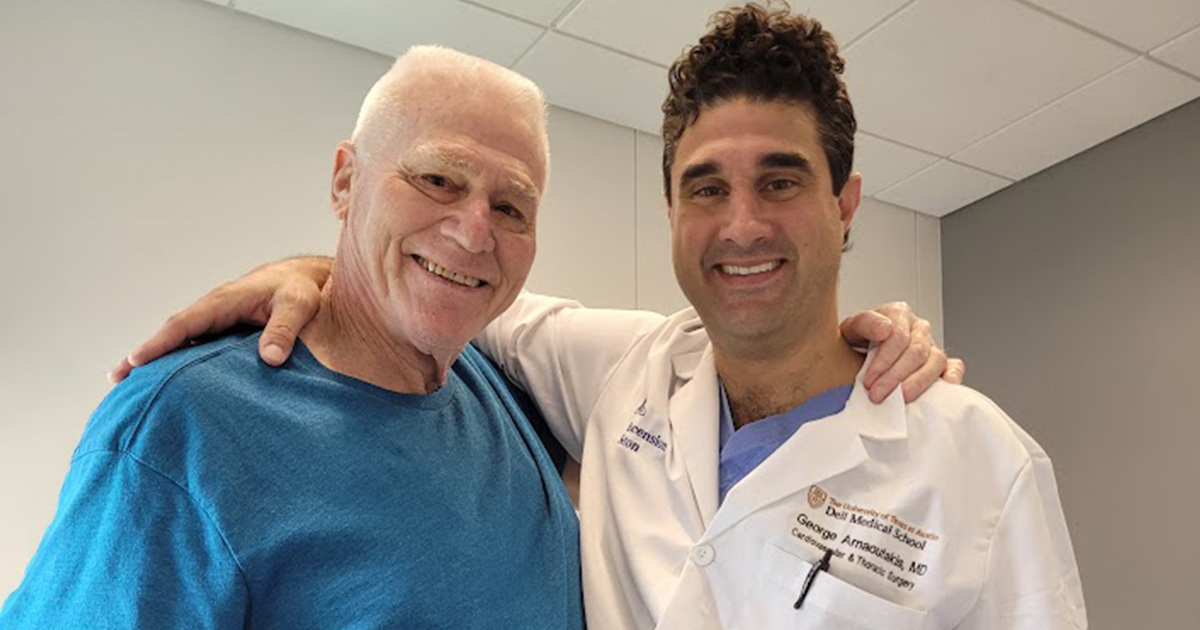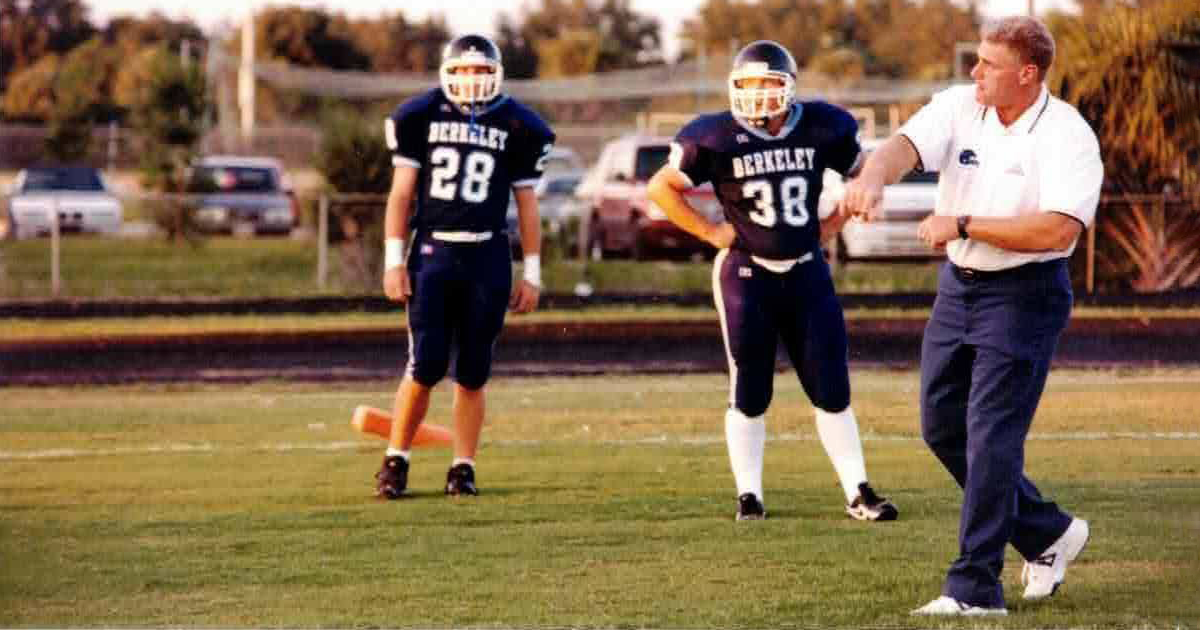From Starting Kicker to Super Surgeon
UT Health Austin cardiothoracic surgeon repairs former high school football coach’s heart
Reviewed by: George Arnaoutakis, MD, and Coach Neil Gruber
Written by: Ashley Lawrence

At the age of 71, Coach Neil Gruber was diagnosed with a bicuspid aortic valve with stenosis and an ascending aortic aneurysm. “I really didn’t have any symptoms,” recalls Coach Gruber. “I have always known that I have a heart murmur ever since my initial physical exam when I started playing football in the 7th grade. My primary care provider suggested it may be time to schedule a checkup with a cardiologist.”
A bicuspid aortic valve is a congenital heart condition where the aortic valve, which regulates blood flow from the heart’s left ventricle to the aorta, has only two leaflets (or cusps) instead of the typical three. This anomaly can affect the valve’s function, potentially leading to complications such as aortic stenosis.
Aortic stenosis occurs when the bicuspid valve becomes narrowed or stiffened, impeding the normal flow of blood from the heart to the rest of the body. This narrowing makes it harder for the heart to pump blood efficiently, potentially causing symptoms such as chest pain, shortness of breath, or fainting spells.
An ascending aortic aneurysm refers to a dilation or bulging in the ascending portion of the aorta, the main artery that carries oxygen-rich blood away from the heart and to the rest of the body. When someone has both a bicuspid aortic valve with stenosis and an ascending aortic aneurysm, treatment may require surgical intervention to repair or replace the affected valve or repair the aneurysm.
A Blast From the Past
“After meeting with a cardiologist and undergoing several tests, I was told that my aortic valve needed to be replaced,” explains Coach Gruber. “My wife and I had recently moved to a new area in Florida, and being new to the city, we didn’t know anyone. There were all these excellent facilities nearby, but I still felt uncomfortable. I reached out to my brother, and he suggested I stop concentrating on the facilities and start researching doctors who specialized in treating my condition.”
During his research, Coach Gruber came across George J. Arnaoutakis, MD, a UT Health Austin cardiothoracic surgeon and the Director of Thoracic Aortic Surgery, Cardiovascular Surgery Quality and Outcomes, and the Transcatheter Valve Program for the Institute for Cardiovascular Health, a clinical partnership between Ascension Seton and UT Health Austin. Dr. Arnaoutakis is an acclaimed cardiovascular surgeon who recently joined the Institute for Cardiovascular Health in an effort to expand heart care services in Austin. Additionally, Dr. Arnaoutakis is an associate professor in the Dell Medical School Department of Cardiovascular and Thoracic Surgery at The University of Texas at Austin.
“I coached a high school kicker named George Arnaoutakis,” reveals Coach Gruber. “I thought to myself, ‘How many George Arnaoutakis’ can there be?’ I found his email address online and asked if he could tell me a little bit more about my current situation. Sure enough, he called me right away, and the first words he said to me were, ‘Coach! What is going on?’ In that moment, I knew I reached out to the right person.”
“While we may have lost touch over the years, I am not at all surprised by all that Dr. Arnaoutakis has accomplished,” continues Coach Gruber. “I’ve been coaching for a long time, and you start to get a feel for your athletes’ futures. He was a very dedicated student and athlete who went on to attend a top tier school on an athletic scholarship. I knew he was destined for some kind of greatness.”

A Seamless Transition of Care
Within days, Dr. Arnaoutakis reviewed Coach Gruber’s medical records and confirmed that Coach Gruber would need open-heart surgery to repair his aortic valve. “I asked him how quickly he could get me in, because I couldn’t imagine being in the hands of a better surgeon,” shares Coach Gruber.
Three weeks later, on September 18th, 2024, Coach Gruber flew from Florida to Austin. “I flew in on the 18th, completed all my pre-op requirements on the 19th, and was prepped for surgery on the morning of the 20th,” notes Coach Gruber. “The entire staff, from the surgeons to nurses and even the physical therapists, were fantastic. The care I received was unbelievable, and I was up and walking without a walker by the next day. Everyone I passed in the halls would call out, ‘Hey coach, how are you doing?’ It made me feel right at home.”
“As a coach who has traveled with teams in the past, I expected to run into logistical problems at the very least,” adds Coach Gruber. “But everything from securing flights and a hotel to arranging transportation and undergoing surgery worked like a well-oiled clock. While I don’t recommend open-heart surgery if you can avoid it, I couldn’t have asked for a better experience.”
10 days after his surgery, Coach Gruber was cleared to return home. “I’m an active guy, which helped speed up my recovery process a bit,” says Coach Gruber. “I felt great and was ready to swing a golf club, but Dr. Arnaoutakis warned me that I would have a wait a little while longer before I could resume certain activities. I began walking the streets of my neighborhood instead. My neighbors started questioning whether I had open-heart surgery at all. I assured them I have the scars to prove it. Now, they refer to Dr. Arnaoutakis as the ‘super surgeon.’”
For more information about the Institute for Cardiovascular Health or to request an appointment, call 1-512-324-3028 or visit here.